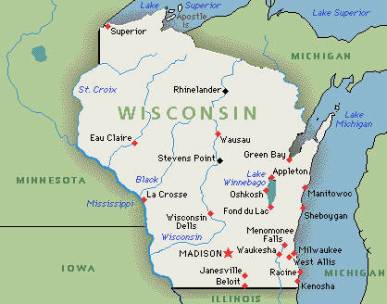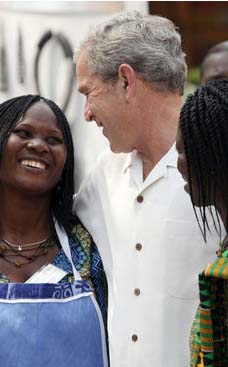
Schramm jokes that his interest in disaster management developed partly out of self-defense: While working as a Peace Corps volunteer in the 1960s, he experienced an earthquake in Venezuela. He endured another one in Chile in the 1970s, and a third while in Colombia in the 1980s. He and his wife particularly recall the Chile earthquake, which occurred while Schramm was a Peace Corps program director. Although most earthquakes last a matter of seconds, that one lasted almost two minutes. "When your frame of reference is shaking, you find either fear or faith," Schramm says. He found faith - and the beginnings of an interest in disaster preparedness. After working in Chile, Schramm moved to Wisconsin to live in an area that could offer a university and access to state government, as well as the space to live on a small farm. He began teaching in the Department of Engineering Professional Development in the late 1970s and reconnected with another former Peace Corps volunteer, Paul Thompson. Schramm also met disaster and refugee expert Frederick Cuny, and the three put their heads together on the terrace at the UW-Madison Memorial Union and decided to form the DMC. Schramm has led training workshops around in the world for local and national governments and international organizations. The goal of the DMC is to help these institutions improve their emergency management performance in the case of a disaster.
Venezuela RPCV Don Schramm says a commitment to helping others is what led him to disaster management
Rethinking disaster management by focusing on development
4/24/2008
MADISON - How we think about a disaster stems from the origin of the word itself: "Disastro" is the Latin word meaning "from the stars."
Yet the idea that a disaster is an uncontrollable, divine event is something Don Schramm does not accept.
Director of the University of Wisconsin-Madison Disaster Management Center (DMC) and a faculty associate in the Department of Engineering Professional Development, Schramm teaches people in government agencies and local communities around the world how to lessen the impact of a disaster.
An architect by training with a master's degree in landscape architecture, Schramm says a commitment to helping others is what led him to disaster management.
"I have a strong belief in the idea of public service," he says.
Schramm, a Missouri native who grew up in New Jersey, has found himself in the middle of hazards. He jokes that his interest in disaster management developed partly out of self-defense: While working as a Peace Corps volunteer in the 1960s, he experienced an earthquake in Venezuela. He endured another one in Chile in the 1970s, and a third while in Colombia in the 1980s.
He and his wife particularly recall the Chile earthquake, which occurred while Schramm was a Peace Corps program director. Although most earthquakes last a matter of seconds, that one lasted almost two minutes. "When your frame of reference is shaking, you find either fear or faith," Schramm says.
He found faith - and the beginnings of an interest in disaster preparedness.
After working in Chile, Schramm moved to Wisconsin to live in an area that could offer a university and access to state government, as well as the space to live on a small farm.
He began teaching in the Department of Engineering Professional Development in the late 1970s and reconnected with another former Peace Corps volunteer, Paul Thompson. Schramm also met disaster and refugee expert Frederick Cuny, and the three put their heads together on the terrace at the UW-Madison Memorial Union and decided to form the DMC.
Schramm has led training workshops around in the world for local and national governments and international organizations. The goal of the DMC is to help these institutions improve their emergency management performance in the case of a disaster.
For years, disaster management was synonymous with "relief," says Schramm.
However, in the early 1980s, the DMC promoted a new outlook that linked disasters with development. Good development can mitigate a disaster, says Schramm, while bad development can exacerbate the damage.
"There's an old medical proverb - an ounce of prevention is worth a pound of cure," says Schramm. "For years, agencies involved in disasters thought just about disaster relief and pouring money in after the fact."
The message has caught on. In 1982 - the year the DMC was started with a grant from the Office of United States Foreign Disaster Assistance, which is an arm of the Agency for International Development - less than 20 organizations around the world looked at disaster preparedness. Today, there are 500 organizations in the United States alone.
More than 3,500 people have enrolled in self-study courses offered online by the DMC since the late 1980s. As a public service, the course materials are free and available to anyone; those who wish to earn continuing education credits pay enrollment fees. In 1994, the center created a distance-education diploma in disaster management.
Walter Green III is an associate professor of emergency management and chair of the Undergraduate Emergency Services Management and Graduate Disaster Science programs at the University of Richmond in Virginia. As a former DMC student, Green says the courses are valuable because they address issues not commonly discussed in U.S. emergency management training and do so independently of U.S. emergency management doctrine.
"This was important to me in helping to develop my skills in the critical analysis of disaster doctrine a very important skill set for a disaster researcher and professor of emergency management," he says.
Additionally, the distance-learning approach was appealing to Green. "With a full professional life and significant volunteer commitments, this was the only practical way to study," Green says.
It's the Wisconsin Idea "grown large," Schramm says of the DMC offerings. "The boundaries of the university are not just the boundaries of the state - they are the boundaries of the world."
At the core of the DMC message is a distinction between disasters and hazards. "It's a nuance, but it's an important one. Most people would think 'hazard' and 'disaster' mean the same thing," explains Schramm. "Hazards happen all the time -earthquakes, tsunamis and hurricanes are hazards. But these are not disasters unless the people impacted can't cope with them."
Schramm tells his seminar participants about the massive 1812 earthquake in New Madrid, Missouri. The strongest U.S. earthquake in the last 200 years, it was powerful enough to be felt in Madison and ring church bells in Boston.
Yet Schramm calls it a hazard, not a disaster.
"It was not a disaster because the people in New Madrid were scattered. Their infrastructure survived," he says. "They coped with the earthquake."
Green says the message of the DMC changed his outlook on disasters. "The DMC made a real difference in how I viewed disasters and gave me new ways to think about bad things both in and outside the United States," he says. "I count it as a formative experience in my development as an emergency manager and disaster scientist."
In addition to redefining disaster, the DMC also focuses on tailoring development strategies to the affected communities. "It's all about increasing local capacity, from the individual level to organizations and governments. We want to help countries work out their disaster mitigation," says Schramm, adding that the DMC made the decision early on to work outside of the United States because so many organizations were already focused on U.S. needs.
To illustrate the success a dedicated local community can have in mitigating recurrent hazards, Schramm uses an anecdote from close to home.
"One of the most interesting stories of disaster mitigation was in Wisconsin in 1978," he says. Set along the Kickapoo River, the small southwestern Wisconsin community of Soldier's Grove solved its flooding issues by moving the business section of town to higher ground.
That type of solution doesn't happen very often, Schramm says.
The story of Soldier's Grove also illustrates the fine line between man-made disasters and natural disasters. "People think there are a lot more natural disasters these days, but the number of hazards that occur has not really changed. In many parts of the world, urbanization has actually caused the growth of the numbers of disasters," Schramm says.
Many believe "it's not going to happen to me," he says, and they move back into known hazardous areas.
Schramm calls this sense of invincibility "generational amnesia": If a disaster doesn't happen to you or someone directly related to you, it's not going to happen.
The challenge of overcoming generational amnesia is the same challenge disaster managers faced in the early 1980s. What has changed is that institutions like the DMC can provide a lot more information about development, says Schramm. "I see it in terms of the old Peace Corps strategy: Help people help themselves," he says. "Develop something that helps other develop."
Some international disasters are most certainly man-made. The DMC has worked extensively on refugee crisis issues. In the early 1980s, some of the first training workshops the center offered were at the request of the United Nations High Commissioner for Refugees.
The workshops for United Nations staff and partner organizations were among the few times the DMC has brought speakers to Madison; usually workshops are held in the countries where they are needed or provided through distance learning activities.
The work on refugee crises has grown. Since 1988, approximately 3,400 people from 125 countries have participated the DMC training program for refugee emergencies.
Schramm went to Rwanda shortly after the genocide in 1994 to evaluate the performance of the United Nations High Commissioner for Human Rights. Later, he and colleagues offered programs to help the United Nations and local government organization staff work with refugees and internally displaced people.
Training workshops are only one way in which the DMC supports those helping to manage or mitigate disasters. The center is part of the ProVention Consortium, a global coalition of international organizations, national and local governmental organizations, and private businesses working to reduce the risk of disaster around the world.
In 2003, the DMC was invited to help organize an action research grants program for young professionals working in risk reduction throughout the developing world.
Schramm traveled to Panama City, Panama, in mid-April for the consortium annual gathering. That trip was on the heels of a trip to Barbados for a workshop about Caribbean disaster risk reduction and distance learning.
Schramm guesses he has traveled to almost 100 countries in the course of his work for the DMC. He says there are plenty more countries he would love to visit and work in.
"There is a lot to be done everywhere," he says.
Ultimately, Schramm hopes the DMC will help establish centers like it around the world. Already, more than 10 such centers have begun with some input from the DMC.
As for combating the etymology of the word "disaster" and its Latin connotations of helplessness, Schramm looks to the Chinese language.
"In China, the word for 'crisis' is actually composed of two separate characters: danger and opportunity," he says. "Disaster is both a problem and an opportunity to bring the community back to where it was - or even improve the community beyond where it was before."
Schramm prefers the Chinese interpretation.
Editor's note: This story is part of a biweekly series focusing on The Wisconsin Idea in action. For more, visit http://www.wisconsinidea.wisc.edu/.
###
- Sandra Knisely, (608) 262-2481, perspective@engr.wisc.edu








